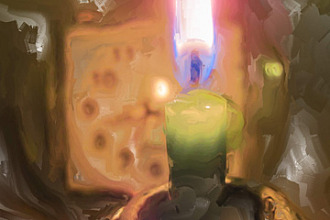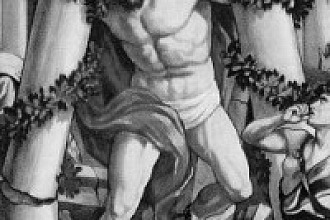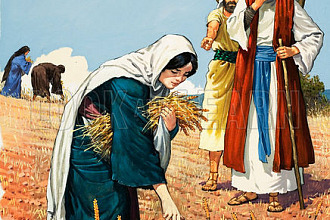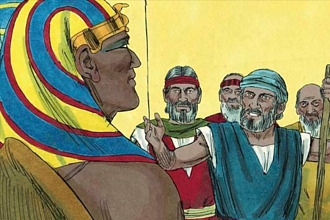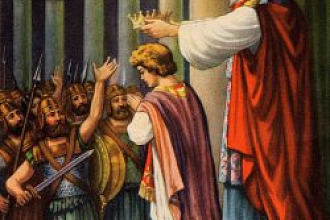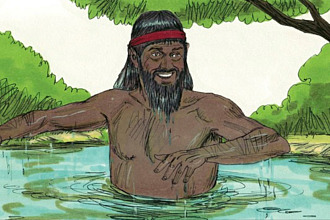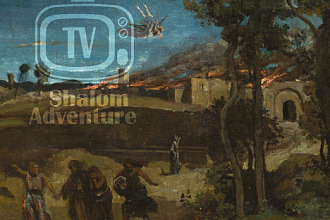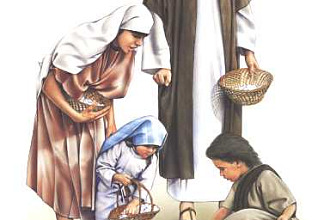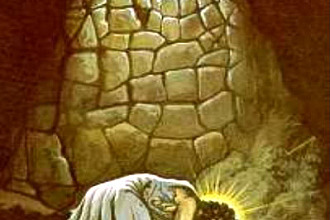"But Yeshua went to the Mount of Olives. At daybreak, he appeared again in the Temple Court, where all the people gathered around him, and he sat down to teach them. The Torah-teachers and the P'rushim brought in a woman who had been caught committing adultery and made her stand in the center of the group. Then they said to him, 'Rabbi, this woman was caught in the very act of committing adultery. Now in our Torah, Moshe commanded that such a woman be stoned to death. What do you say about it?' They said this to trap him, so that they might have ground for bringing charges against him; but Yeshua bent down and began writing in the dust with his finger.
When they kept questioning him, he straightened up and said to them, 'The one of you who is without sin, let him be the first to throw a stone at her.' Then he bent down and wrote in the dust again. On hearing this, they began to leave, one by one, the older ones first, until he was left alone, with the woman still there. Standing up, Yeshua said to her, 'Where are they? Has no one condemned you?' She said, 'No one, sir.; Yeshua said, "Neither do I condemn you. Now go, and don't sin anymore." John 8:1-11
Some people who read this say Yeshua disregarded the law by not having the woman stoned but that' is not the case. The Torah says, "If a man is found sleeping with a woman who has a husband, both of them must die — the man who went to bed with the woman and the woman too. In this way you will expel such wickedness from Isra'el." Deuteronomy 22:22. Now an important question is if she was caught in the "very act" of adultery why wasn't the man brought along with her? There is no excuse for the man to be missing. The Torah says both parties are to be stoned not just the woman. If the Torah teachers honestly paid attention they would see that they were not following the Torah themselves.
Also there are cases in the Torah where even in the face of obvious sexual sin neither party is to be stoned because of the situation. "'Whoever lies carnally with a woman who is betrothed to a man as a concubine, and who has not at all been redeemed nor given her freedom, for this there shall be scourging; but they shall not be put to death, because she was not free. And he shall bring his trespass offering to the Lord, to the door of the tabernacle of meeting, a ram as a trespass offering.'" Leviticus 19:20-21 and this is not the only example like this. So Yeshua actually can be in harmony with the law by not ordering her and the guilty man to be stoned and I trust Yeshua knew the full situation of the case. The Torah teaches mercy is part of strict justice which is a principle many seem to miss. Contrary to what some seem to assume, stoning wasn't enforced for every sin and every sin wasn't treated the alike even when the result was the same. In Torah circumstances were taken into account.
Speaking of circumstances, we can see something is clearly extremely questionable about the circumstances surrounding case brought to Yeshua because however you look at it those who urged Yeshua to handle the case where not following the law regarding what should be done according to the Torah. How it was handled showed a lack of honesty and it wouldn't surprise me if the man she was caught in the "very act" of adultery with-yet who was conveniently left out of the case was actually a part of the plan. After all "They said this to trap him" but whether the man was in on it or not the situation was clearly a setup by the people claiming to be concerned about the Torah in order to follow their own political goals rather than the law of God. Yeshua did not contradict the law, but the teachers of the law did and were even willing to sacrifice a person's life for the sake of their pride and selfish ambition. That is why they had to leave when Yeshua said "The one of you who is without sin, let him be the first to throw a stone at her." It wasn't because Yeshua taught the law didn't matter, it is because it does.
Picture originally found here







